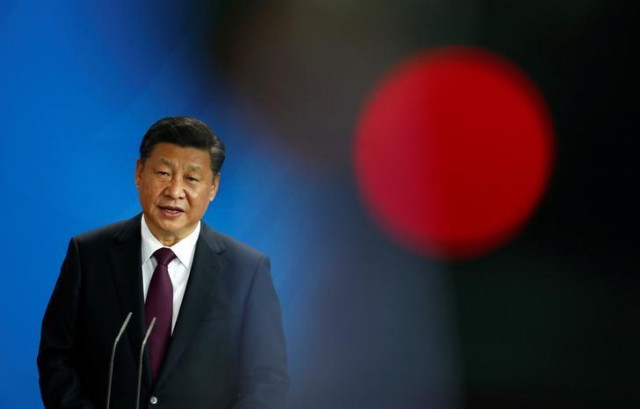CM expects CPEC projects to get nod during Xi’s visit
Hopes formalities, paperwork for KCR, Dhabeji SEZ, Keti Bunder port will be completed during visit

Chinese President Xi Jinping (PHOTO: REUTERS)
"The Chinese president is expected to visit between May and June this year," he said, expressing the hope that all the formalities and documentation pertaining to CPEC projects, including the Karachi Circular Railway (KCR), Dhabeji Special Economic Zone (SEZ) and Keti Bunder Seaport, would be completed during the visit.
KCR
Speaking about the KCR, Shah informed the meeting that a framework agreement for the project was to be signed between Pakistan and the Chinese planning commission, the National Development and Reform Commission. The concession agreement to be signed by both the parties was being prepared, he said, adding that the Sindh government and Pakistan Railways had reached a consensus on giving KCR the right of way on the ML-1, the line connecting Karachi and Peshawar corridor.
Special economic zones to be built in second phase of CPEC
Saying that KCR was a top priority for CPECA, Bajwa said that besides seeking approval for new projects, he would also discuss the approved projects with the Chinese president so that work on them could be started at the earliest possible opportunity.
Thar coal
The CM also apprised the meeting about a 105-kilometre-long railway line, which would be constructed from Chhor to Islamkot to facilitate the transportation of coal from Thar coalfield to Port Qasim and further upcountry. Apart from this, the installation of a 1,320 megawatt power plant in Thar Coal block-IV and multiple other coal and gas schemes have also been approved under CPEC, he said.
Speaking along the same lines, Bajwa too stressed the importance of constructing a railway line from Chhor to Islamkot.
Dhabeji SEZ
Shah said that 1,530 acres of land was earmarked for Dhabeji SEZ. Once constructed, the zone would help save on the time and cost of transporting raw materials, imports and finished goods from Port Qasim, he added.
"Besides, Dhabeji zone will have access to the Jinnah Terminal, located not more than 35km away from the National Highway, which will ensure safe travel for foreign workers in the region," the CM explained. The zone, he said, would also have direct access to the National Highway, further facilitating the transportation of goods upcountry and would provide a feasible means of benefitting from a trade corridor with Central Asian nations.
The project had been approved by the Executive Committee of the National Economic Council (ECNEC), for which K-Electric had agreed to supply 250MW of electricity, at a cost of Rs4 billion, the CM told the participants of the meeting.
CPEC as a game changer?
Keti Bunder Seaport
Meanwhile, Bajwa pointed out the need to ease the burden on Karachi Port Trust, which experienced heavy cargo traffic. For this purpose, a plan had been worked out for the construction of an expressway linking the Malir Expressway to the sea, he said.
At this, the CM underlined the significance of Keti Bunder, saying that too was a good alternative to KPT. He said that Keti Bunder was located at a distance of just 107km from Thatta and could be accessed from Karachi after covering a distance of 150km via Gharo, offering promising prospects as a seaport. "[Hence], the Keti Bunder Seaport project is important for development in the energy sector," he said.
Shah told the meeting that a private firm was assigned the task to conduct a technical and financial feasibility study for the project in December, 2019, adding that the firm would likely submit the feasibility report by the end of February.
Published in The Express Tribune, February 22nd, 2020.



















COMMENTS
Comments are moderated and generally will be posted if they are on-topic and not abusive.
For more information, please see our Comments FAQ